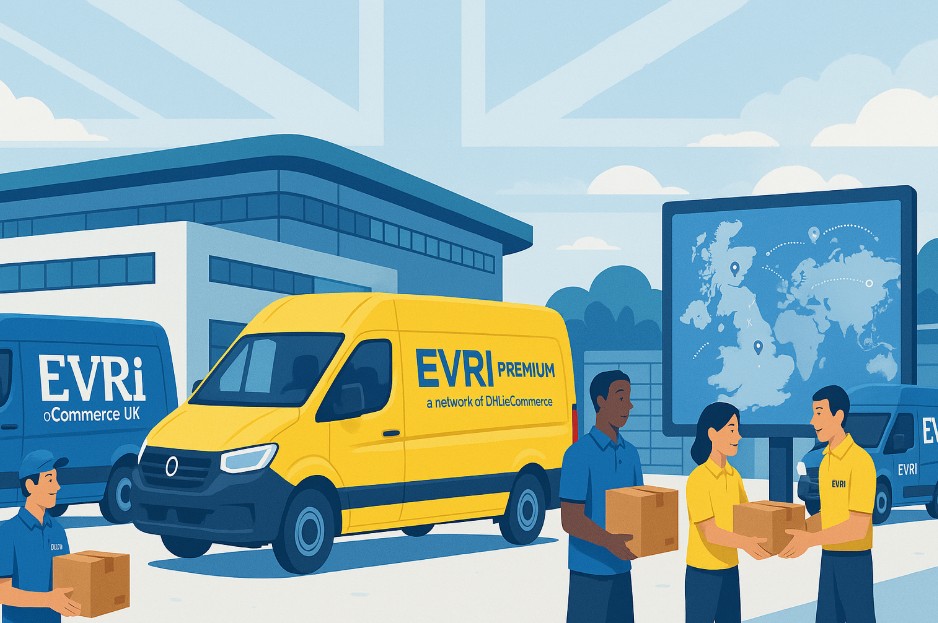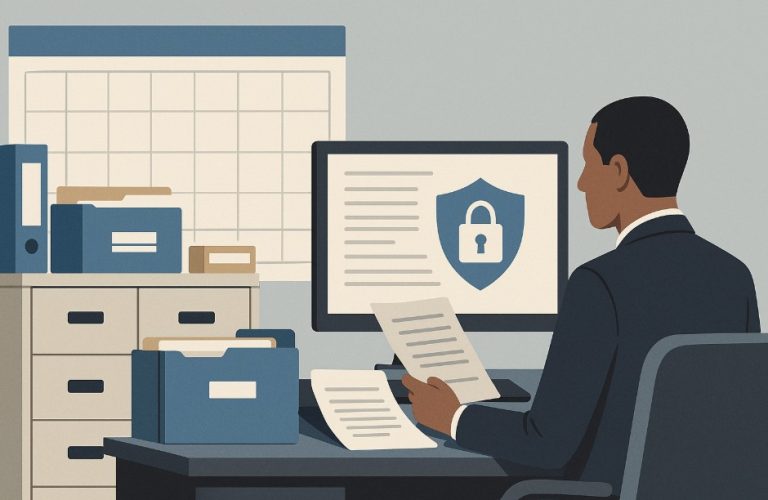DHL eCommerce UK and Evri Merger 2025: What This Means for the Future of UK Deliveries?
On 14 May 2025, a major transformation was announced in the UK logistics industry: DHL eCommerce UK and Evri are merging in a strategic move to form what is being positioned as the leading parcel delivery group in the United Kingdom.
This merger is more than a corporate agreement; it is a recalibration of the delivery landscape, aimed at creating a one-stop solution for both domestic and international logistics.
The merged entity is expected to handle over 1 billion parcels and an additional 1 billion business letters annually. With this significant delivery volume, the combined group intends to redefine parcel logistics by offering greater service diversity, enhanced delivery speed, and cost-effective solutions for businesses and consumers alike.
Evri, known for its expansive and flexible domestic delivery network, is set to complement the high-performance, premium van services provided by DHL eCommerce. The integration is designed to not only expand operational capability but also improve customer satisfaction across the board.
Why Did DHL and Evri Decide to Merge in 2025?

The UK parcel delivery market has experienced rapid evolution in recent years, largely driven by the explosive growth of online shopping. Customers now expect faster delivery, broader options, and more visibility on where their parcels are at any given moment.
Logistics companies are under immense pressure to meet these demands while managing costs and maintaining profitability.
The decision to merge was underpinned by several strategic imperatives:
- Market alignment: DHL eCommerce UK and Evri are highly complementary. While Evri dominates in flexible and cost-effective deliveries, DHL eCommerce brings global expertise, technological sophistication, and premium logistics infrastructure.
- Efficiency through scale: Combining networks allows for more optimised delivery routes, fewer redundancies, and better utilisation of resources such as drivers, vehicles, and depots.
- Diversified offerings: From lightweight letters to large, high-value items, the new group will provide an end-to-end logistics solution that caters to the entire spectrum of e-commerce requirements.
- Enhanced international reach: DHL’s expansive global delivery network, including access to over 150,000 out-of-home access points worldwide, will significantly enhance Evri’s outbound and inbound parcel capabilities.
This move also represents a significant growth opportunity for DHL, which will acquire a major minority stake in the combined business, with provisions to deepen its involvement in future phases.
How Did DHL eCommerce UK and Evri Compare Before the Merger?
To appreciate the impact of the merger, it’s important to understand the core strengths each entity brought to the table:
| Feature | DHL eCommerce UK | Evri |
| Delivery Focus | International and UK parcel logistics | UK domestic parcel delivery |
| Parcel Volume | Moderate | 800M+ annually |
| Delivery Types | Tracked, timed, international | Economy, standard, and flexible courier |
| Premium Services | Yes – Van-based, high-security | Limited prior to merger |
| Out-of-Home Network | 5,000+ points | 10,000+ points |
| Technology Integration | Global logistics and tracking systems | Domestic systems, mobile app-based |
| Reputation | Premium, efficient, global scale | Cost-effective, improving brand trust |
The merger leverages DHL’s international reliability and scale with Evri’s agility and cost-efficiency, enabling a comprehensive suite of logistics services.
What Are the Key Benefits and Challenges of the Merger?
The union is poised to offer a host of benefits to retailers, consumers, and small businesses.
Key benefits include:
- An enhanced service portfolio that combines cost-effective standard delivery and premium high-value shipping under one roof.
- Integration of DHL’s global access points to support cross-border e-commerce more effectively.
- Creation of Evri Premium, a dedicated van network operated by DHL eCommerce to handle time-sensitive and high-value shipments.
- Entry into the UK business letter market, offering a reliable mail service via the retained DHL UK Mail operation.
This service expansion is complemented by infrastructure scaling. The newly merged group will be powered by:
| Metric | Post-Merger Figure |
| Annual Parcel Deliveries | 1 Billion+ |
| Annual Letter Deliveries | 1 Billion |
| Couriers and Van Drivers | 30,000+ |
| Fleet Vehicles | 8,000 |
| Out-of-Home Locations (UK) | 15,000 |
| Global Access Points | 150,000+ |
However, the merger is not without its challenges. Integrating systems, aligning corporate cultures, and communicating clearly with existing customers and partners will be crucial. Moreover, brand perception will need careful management to avoid confusion, particularly with the rebranding of DHL eCommerce UK under the “Evri Premium” banner.
How Will the UK Parcel Delivery Market Be Affected?

This merger marks a new phase of consolidation in the UK logistics industry. By merging, DHL and Evri become direct competitors to the likes of Royal Mail, Amazon Logistics, and DPD, potentially initiating a new wave of innovation and price competition.
Smaller logistics companies may feel pressured to form partnerships or adopt more niche strategies.
Meanwhile, consumers could see faster services at lower costs, and retailers may benefit from more comprehensive fulfilment options without having to juggle multiple delivery contracts.
Additionally, the focus on sustainable operations is a goal shared by both companies will likely set new benchmarks for environmentally responsible delivery.
What Does This Merger Mean for UK E-commerce Retailers?
For e-commerce sellers, the merger is set to bring a range of benefits that go beyond parcel logistics. The new group promises to become an SME logistics partner, offering services such as:
- Mail and lightweight delivery
- Large item handling with security tracking
- International fulfilment and cross-border returns
- Access to both the economy and premium options
Retailers currently working with either Evri or DHL eCommerce can expect better contract flexibility, consolidated invoicing, and fewer delivery failures.
For high-volume businesses, this could mean substantial improvements in fulfilment speed and cost efficiency.
How Will the Merger Change the Experience for UK Consumers?

UK consumers are likely to notice several upgrades in the months following the merger. These include:
- Improved parcel tracking with real-time notifications
- Faster deliveries via the Evri Premium network
- Access to the largest out-of-home collection and drop-off network in the country
- Better handling of high-value, fragile, or urgent deliveries
For the average online shopper, this means more options, greater convenience, and enhanced reliability, especially for time-critical purchases.
What’s Next for UK Delivery Services After the Merger?
The logistics sector is undergoing significant transformation, and this merger is a clear sign of what’s to come. The newly formed entity has laid out ambitious goals that include:
- Expanding its sustainable fleet, including electric delivery vehicles
- Launching AI-driven route optimisation for faster, greener deliveries
- Enhancing B2B and B2C premium services, especially for high-value sectors
- Offering a “one contract” logistics model for SMEs to simplify parcel, letter, and international shipping
Martijn de Lange, CEO of Evri, will lead the combined business, supported by Stu Hill, who will become MD of the Evri Premium network.
The transition is set to be smooth, with the executive teams of both organisations continuing in leadership roles to ensure operational continuity.
How Do DHL eCommerce UK and Evri Compare Before and After the Merger?
| Feature | Pre-Merger DHL eCommerce | Pre-Merger Evri | Post-Merger Entity |
| Annual Parcels | Moderate | 800M+ | 1 Billion+ |
| Annual Letters | UK Mail (Limited) | Not Offered | 1 Billion |
| Delivery Speed Options | Tracked, Premium | Standard, Economy | Standard + Premium |
| Brand Identity | DHL | Evri | Evri + Evri Premium |
| Global Reach | Extensive | Limited | Expanded Worldwide |
| Out-of-Home Access Points (UK) | 5,000+ | 10,000+ | 15,000+ |
| Couriers and Drivers | Thousands | 25,000+ | 30,000+ |
Is the DHL-Evri Merger a Major Step Forward for UK Logistics?

Without doubt, the merger between DHL eCommerce UK and Evri is a defining event in the evolution of parcel logistics in the UK.
It brings together two complementary forces, Evri’s cost-effective scalability and DHL’s premium international logistics, into a single entity capable of serving businesses and consumers with precision, flexibility, and speed.
The new delivery group isn’t just about capacity, it’s about creating a smarter, more integrated logistics experience from checkout to doorstep.
With an eye on sustainability, global expansion, and customer satisfaction, this move firmly places the new Evri Group at the forefront of the UK’s parcel delivery market.
Frequently Asked Questions (FAQs)
Will DHL and Evri accounts be combined?
Yes, though the process will be phased. Customers can expect a unified platform and login access in the near future.
What happens to Evri drop-off locations?
All existing locations will remain operational, with more being added to build the UK’s largest out-of-home network.
Will delivery services improve post-merger?
Yes, especially for premium and international shipments. The merger will allow better route planning and faster turnaround times.
Are small businesses expected to benefit?
Absolutely. SMEs will have access to tailored logistics packages covering mail, parcel, and fulfilment services under a single provider.
Will DHL’s UK Mail service still exist?
Yes, it will continue under the merged group, helping expand business mail services, especially for lighter-weight e-commerce items.
How will the merger affect pricing?
Cost-efficiency is a core goal. Larger scale and optimised operations are expected to deliver more competitive pricing models.
Who will lead the combined group?
Martijn de Lange will be CEO, with Stu Hill leading the Evri Premium division. Both leadership teams will stay involved.







